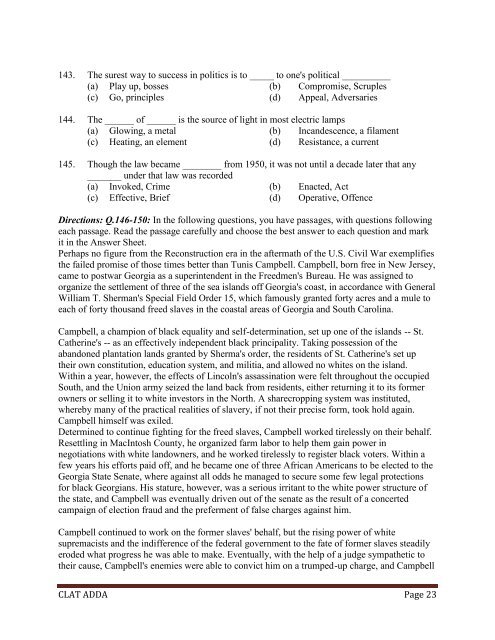NALSAR University of Law, Hyderabad ENTRANCE TEST PAPER ...
NALSAR University of Law, Hyderabad ENTRANCE TEST PAPER ...
NALSAR University of Law, Hyderabad ENTRANCE TEST PAPER ...
Create successful ePaper yourself
Turn your PDF publications into a flip-book with our unique Google optimized e-Paper software.
143. The surest way to success in politics is to _____ to one's political __________<br />
(a) Play up, bosses (b) Compromise, Scruples<br />
(c) Go, principles (d) Appeal, Adversaries<br />
144. The ______ <strong>of</strong> ______ is the source <strong>of</strong> light in most electric lamps<br />
(a) Glowing, a metal (b) Incandescence, a filament<br />
(c) Heating, an element (d) Resistance, a current<br />
145. Though the law became ________ from 1950, it was not until a decade later that any<br />
_______ under that law was recorded<br />
(a) Invoked, Crime (b) Enacted, Act<br />
(c) Effective, Brief (d) Operative, Offence<br />
Directions: Q.146-150: In the following questions, you have passages, with questions following<br />
each passage. Read the passage carefully and choose the best answer to each question and mark<br />
it in the Answer Sheet.<br />
Perhaps no figure from the Reconstruction era in the aftermath <strong>of</strong> the U.S. Civil War exemplifies<br />
the failed promise <strong>of</strong> those times better than Tunis Campbell. Campbell, born free in New Jersey,<br />
came to postwar Georgia as a superintendent in the Freedmen's Bureau. He was assigned to<br />
organize the settlement <strong>of</strong> three <strong>of</strong> the sea islands <strong>of</strong>f Georgia's coast, in accordance with General<br />
William T. Sherman's Special Field Order 15, which famously granted forty acres and a mule to<br />
each <strong>of</strong> forty thousand freed slaves in the coastal areas <strong>of</strong> Georgia and South Carolina.<br />
Campbell, a champion <strong>of</strong> black equality and self-determination, set up one <strong>of</strong> the islands -- St.<br />
Catherine's -- as an effectively independent black principality. Taking possession <strong>of</strong> the<br />
abandoned plantation lands granted by Sherma's order, the residents <strong>of</strong> St. Catherine's set up<br />
their own constitution, education system, and militia, and allowed no whites on the island.<br />
Within a year, however, the effects <strong>of</strong> Lincoln's assassination were felt throughout the occupied<br />
South, and the Union army seized the land back from residents, either returning it to its former<br />
owners or selling it to white investors in the North. A sharecropping system was instituted,<br />
whereby many <strong>of</strong> the practical realities <strong>of</strong> slavery, if not their precise form, took hold again.<br />
Campbell himself was exiled.<br />
Determined to continue fighting for the freed slaves, Campbell worked tirelessly on their behalf.<br />
Resettling in MacIntosh County, he organized farm labor to help them gain power in<br />
negotiations with white landowners, and he worked tirelessly to register black voters. Within a<br />
few years his efforts paid <strong>of</strong>f, and he became one <strong>of</strong> three African Americans to be elected to the<br />
Georgia State Senate, where against all odds he managed to secure some few legal protections<br />
for black Georgians. His stature, however, was a serious irritant to the white power structure <strong>of</strong><br />
the state, and Campbell was eventually driven out <strong>of</strong> the senate as the result <strong>of</strong> a concerted<br />
campaign <strong>of</strong> election fraud and the preferment <strong>of</strong> false charges against him.<br />
Campbell continued to work on the former slaves' behalf, but the rising power <strong>of</strong> white<br />
supremacists and the indifference <strong>of</strong> the federal government to the fate <strong>of</strong> former slaves steadily<br />
eroded what progress he was able to make. Eventually, with the help <strong>of</strong> a judge sympathetic to<br />
their cause, Campbell's enemies were able to convict him on a trumped-up charge, and Campbell<br />
CLAT ADDA Page 23


